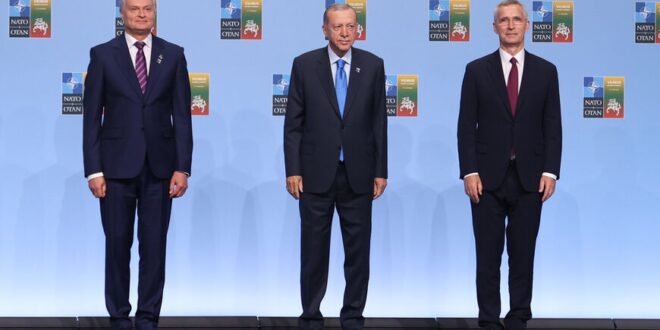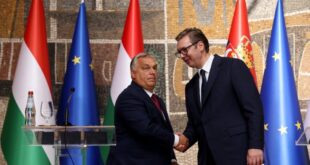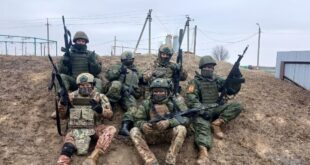The Turkish leader is navigating Ankara’s relationships in ways that he believes best benefit Turkey’s interests and above all his own political survival.
Turkish President Recep Tayyip Erdogan’s “U-turn” on Sweden’s accession to NATO during the alliance summit in Vilnius has prompted a flurry of Western commentary on how Turkey may be pivoting away from Russia and returning to the Western fold. “How long can [Russian President Vladimir] Putin’s ‘special relationship’ with Erdogan last?” asked the Lowy Institute. “Russia’s war might have a new casualty: The Putin-Erdogan bond,” opined The Washington Post. Not everyone agrees.
The Kremlin will certainly not have been too pleased by the images of Erdogan and President Joe Biden all smiles during their more than an hour-long meeting. Biden hailed the Turkish leader for his “courage, leadership and diplomacy” after Erdogan said he would tell the Turkish parliament to ratify Sweden’s membership. Biden even posted a video on his official Twitter feed singing the Turkish strongman’s praises. Erdogan called Biden “a dear friend.”
Yesterday, Türkiye reached a historic agreement on the admission of Sweden into NATO. President Erdoğan, thank you for your courage, leadership, and diplomacy.
This summit reaffirms our commitment to the NATO defense, and I hope we can continue to make it even stronger. pic.twitter.com/RVfPIVrLr6
— President Biden (@POTUS) July 12, 2023Russia was already riled by Erdogan’s warm embrace of Ukrainian President Volodymyr Zelenskyy during his first trip to Turkey since his country’s occupation by Russian forces.
It didn’t help that Zelenskyy flew back home with five former Azov commanders who had fought in the battle over Mariupol, part of a prisoner swap brokered by Ankara. The move went against “the terms of existing agreements — these persons were supposed to stay on the territory of [Turkey],” Kremlin spokesperson Dmitry Peskov fumed.
Days later, Ukraine announced that construction had started on a manufacturing plant for Turkey’s fabled Bayraktar drones that proved critical in the defense of Kyiv during the opening days of the conflict. Erdogan said in a joint news conference with Zelenskyy in Vilnius that “there was no doubt that Ukraine deserves NATO membership.”
In April, appearing to bow to US pressure, Turkey halted the transit of sanctioned goods to Russia. (Some however, still get there after being subjected to Turkish import duties and repackaged–making them more costly.)
Viktor Bondarev, chairman of the Committee on Defense and Security in the upper house of Russia’s parliament, complained that Turkey was turning into an “unfriendly country” after “a series of provocative decisions.”
Olga Skabeyeva, a prominent presenter on state-run Rossiya-1, had harsher words. She suggested that Russia could respond to “Turkish investors” with “missiles so that they cannot build such a plant in Ukraine.” The Bayraktars are produced by Erdogan’s younger son-in-law and heir apparent, Selcuk Bayraktar, and his brother, Haluk. And why not provide weapons to Kurdistan Workers Party (PKK) militants waging war against the Turkish state and ban imports of Turkish tomatoes and tangerines, Skabeyeva noted.
In truth, none of this amounts to a pivot away from Russia any more than it does to a reset with the West. It’s just the latest retuning of Erdogan’s unique balancing act in which the Turkish leader navigates Ankara’s relationships in ways that he believes best benefit Turkey’s interests and above all his own political survival. Turkey’s flailing economy remains Erdogan’s top headache ahead of municipal elections that are scheduled to be held in March 2024.
The facade of improved relations with the West is meant to draw back Western investors even as thousands of political prisoners languish in Turkish prisons in defiance of European Court of Human Rights rulings that are binding for Ankara.
They include Metin Topuz, a Turkish national who worked as a liaison between the Drug Enforcement Administration and Turkish police at the US Consulate in Istanbul for years, and who has been locked up since 2017 and sentenced to nine years for supposedly supporting rogue elements in the army who unsuccessfully sought to overthrow Erdogan in 2016.
“When it takes a Herculean, US-led effort to get Turkey to do something most NATO allies don’t think twice about, I wouldn’t call that a reset. I’d call it the status quo,” said Aaron Stein, the chief content officer at Metamorphic Media who has written extensively on US-Turkish ties. Stein was alluding to months of back-channel diplomacy led by the State Department to persuade Erdogan to drop his objections to Sweden’s accession and for Congress to waive its own on F-16 sales to Turkey.
It took less than a day for Erdogan to say that the Turkish parliament would probably be unable to ratify Sweden’s accession before it goes into recess next week, no matter that he has the authority to extend parliament’s session. Erdogan wants firm guarantees that Congress will allow the sale of F-16 fighter jets before signing off fully on Sweden. The Biden administration is pushing hard to get there and likely will.
Behlul Ozkan, a political scientist at Istanbul’s Marmara University, contends that the past week’s developments demonstrate once again that Erdogan is a master of brinkmanship. “There are very few global leaders who can command such political maneuvers,” Ozkan said. Erodgan’s love fest with Biden bolsters his hand in his dealings with Putin, and the idea that Turkey is shifting away from Russia is as absurd as arguing the opposite as numerous Western analysts long did prior to his supposed Vilnius “pivot.” Erdogan never said he would not let Sweden join NATO; he said he would do so on Turkey’s own terms.
“Russia is to Turkey what Canada is to the United States and Germany to France. Russia is our maritime neighbor. We have historical ties. It is our biggest trading partner,” Ozkan recalled. Turkish exports to Russia have skyrocketed since the start of the Ukraine conflict, from $2.6 billion in the first half of 2022 to $4.9 billion over the same period this year.
Erdogan was among the first world leaders to call Putin during last month’s rebellion by Wagner group mercenaries over the conduct of Russia’s war against Ukraine. Though a date has yet to be announced, Putin is expected to visit Turkey in the coming months.
Erdogan’s “special bond” with Putin has facilitated sales of Ukrainian grain via the Black Sea. The deal is due to expire on Monday, and Ankara is mediating between Russia and the UN for its extension and for prisoner exchanges between the warring parties.
It also helped him win parliamentary elections and the presidency in May after most pollsters predicted the opposite, as inflation continued to spiral and the national currency, the lira, plunged from one record low to the next. Russia is Turkey’s top supplier of natural gas, accounting for roughly half of all imports. Ahead of the elections, Putin deferred gas payments worth billions of dollars, among other gestures, noted Aydin Sezer, a Turkish analyst of Russian affairs and a former Turkish trade attache at the Turkish Embassy in Moscow. Russia is building Turkey’s first nuclear plant. At least 6 million Russian tourists are expected to visit Turkey this year, according to the Russian Union of Travel Industry — more than from any other country. Erdogan’s personal relations with Putin set the framework within which the two countries conduct their relations, and these remain largely positive, Sezer said.
Russia plays a key role in helping to contain PKK-allied Syrian Kurdish fighters in Syria, allowing Turkey to seize the majority Kurdish enclave, Afrin, in 2018. The Pentagon’s support for that same group, arming and training it in the US-led coalition’s ongoing campaign to degrade and destroy the Islamic State is a leading source of friction between Turkey and the United States.
The benefits are mutual. Turkey’s refusal to join sanctions against Russia makes it every bit as vital to Russia as Russia is to Turkey, if not more so, by providing a backdoor. Russian oligarchs have found safe haven in Turkey, parking their mega-yachts in Turkish ports and their money in thousands of joint ventures with Turkish partners. It’s no secret that Russian gas continues to find its way to Western markets via the TANAP pipeline running from Azerbaijan to Turkey and onto Europe.
Given the mutual dependency, it was hardly surprising then that the Kremlin’s assessment of Erdogan’s performance at Vilnius was so bland. Russia was well aware of Turkey’s NATO commitments. “This has never been a secret for us. We have never won rose-tinted spectacles in this respect,” Peskov, the Kremlin spokesman, said Tuesday. Rather, it is those who believe that Erdogan is ditching Russia who are wearing them, Sezer said.
 Eurasia Press & News
Eurasia Press & News



